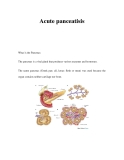
Blood insulin secretion
-
Insulin is the principal regulatory hormone involved in the tight regulation of fuel metabolism. In response to blood glucose levels, it is secreted by the b cells of the pancreas and exerts its effects by binding to cell surface receptors that are present on virtually all cell types and tissues. In humans, perturbations in insulin function and/or secretion lead to diabetes mellitus, a severe disorder primarily characterized by an inability to maintain blood glucose homeostasis. Furthermore, it is estimated that 90–95% of diabetic patients exhibit resistance to insulin action....
 10p
10p  research12
research12
 01-06-2013
01-06-2013
 34
34
 4
4
 Download
Download
-
The name pancreas (Greek pan: all, kreas: flesh or meat) was used because the organ contains neither cartilage nor bone. Physiology Exocrine pancreatic secretion contains multiple of enzymes( trypsinogen, chymotrypsinogen, procarbocypolypeptidase, amylase, cholesterol esterase, phospholipase) to digest proteins, carbohydrates and fats. Endocrine pancreatic secretes insulin, glucagon and somatostatin directly into blood.
 11p
11p  truongthiuyen2
truongthiuyen2
 09-06-2011
09-06-2011
 46
46
 2
2
 Download
Download
CHỦ ĐỀ BẠN MUỐN TÌM














